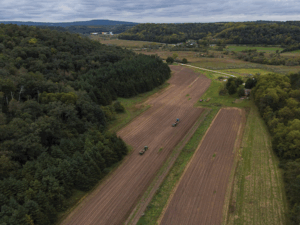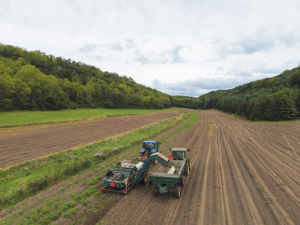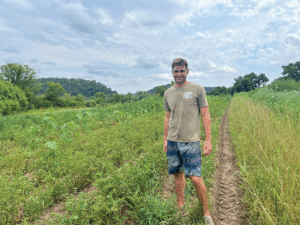
Wisconsin grower keeping alive generational tradition
Jesse Perkins may not have been born to grow potatoes, but his path to a vocation rooted in agriculture was clear.
Perkins grew up in Madison, Wisconsin, before his family moved 30 minutes west to Blue Mounds in 1994 to found Vermont Valley Community Farm, a community supported agriculture (CSA) vegetable grower. The farm sold 40 to 50 different kinds of vegetables, including potatoes, and Perkins, then 13, pitched in to help.
“I’ve never done anything different,” Perkins said. “My parents had a business, and I couldn’t figure out what else to do. Not a very romantic story.”

EVOLUTION TO SEED POTATOES
In 2002, the operation transitioned to producing certified seed potatoes for its use and for other growers and gardeners. With that move came a name change to Mythic Farm, but much remained the same.
The CSA grew organic vegetables since its inception and was certified organic since the USDA’s National Organic Program guidelines were first published in 2000. Perkins’ father still helps out on the farm, especially during harvest season, when Perkins also recruits his wife and two young children.
Also certified by the Midwest Organic Services Association, Mythic Farm now grows around 10 organic seed potato varieties and a half-dozen mini tubers on about four acres, Perkins said. That number is down from the 17 or 18 varieties the farm once produced.
The drop in both varieties and acreage (from around 10 in past years) came after the Wisconsin State Seed Certification Program stopped producing seed stock for some smaller varieties, Perkins said.
Mythic Farm is unlikely to try to produce any new varieties at scale, as that can be a time-consuming and expensive process, Perkins said.
“I need to tell the seed program I want to grow mini-tubers, then grow those for a year,” he said. “There’s three or four years and quite a bit of cost, so you have to be pretty sure that you want to add something.”
Current varieties grown include state staples such as Dark Red Norland, Yukon, Superior and GoldRush Russet. Mythic Farm grows some varieties in conjunction with the University of Wisconsin and has recently planted Silverton Russet among other experimental varieties, “just because we had the seed and it met the (certification) levels,” Perkins said.

OVERCOMING CHALLENGES
While the farm’s family involvement and organic commitment have remained constant, other aspects of the business have weathered change in recent years.
“Last year was really wet. It was the worst field ever because of the flooding,” Perkins said. “Even where it didn’t flood, the hills never dried out and the potatoes rotted in the hills.”
During Spudman’s late July visit, the ground was drier, but Perkins was battling more pests, including aphids and potato leafhopper, with organic oils than in past years.
“Leafhoppoer is a major challenge for us,” he said. “I never really had to make the decision to kill or not, but this year I wanted to kill as soon as possible. We planted a lot of no-cut seed or single-cut.
“I’ve been using a machine cutter. I think it helped with the vigor of the plants. There are so many more stems, a lot more small potatoes, so it’s also hard to judge. They’re not that big, but the poundage coming off each plant is very good.”
Low yields from the 2024 crop led to Perkins buying varieties from another organic seed farm, and he’s repeating the practice this year.
“We’re planning to buy the varieties that we’re not growing this year,” he said. “It’s another change. At the scale we do, the cost of the seed certification is so high for the percentage that we do. If everything goes right, the costs are OK, but as soon as something doesn’t go right …”
Perkins was optimistic that 2025 yields would rebound.
“If we can get close to 30,000 pounds an acre, that would be a good yield for us. I kind of expect that this year,” he said. “If we get 20,000 pounds an acre, we don’t complain. The big thing is, I’d much rather get 20,000 pounds of good potatoes than 30,000 and have to cull a bunch.”
In recent years, Perkins said the quality of Mythic Farm’s seeds has improved. An issue with scab was solved, and potato virus Y that unexpectedly cropped up three years ago has also been handled with cultural treatments, he said.
Mythic Farm’s seed potatoes are shipped to farms, retail outlets and gardeners nationwide.
“It’s everything from one-pound orders to — our biggest farm that we sell to grows probably three acres,” Perkins said. He’s had to reject orders from larger farms, because “that would be my entire harvest.”
“Everybody’s pretty much picked up on the farm, because there’s very few organic seed options,” Perkins said.
The farm added mail order service in 2020, when the COVID-19 pandemic drove demand to higher levels than expected.
“I thought I would maybe get 100 orders,” Perkins said. “I had no idea how to ship or anything else, and I had like 300 orders.”

FAMILY TRADITION
Having learned from those early logistical issues, Perkins said his busy season for shipping begins in late February and runs through early May.
Spring planting prep brings Perkins’ dad back to the fields, while the whole family is called into service during harvest.
“We use a mechanical harvester,” Perkins said. “My dad will drive one tractor, and I’ll drive the other.”
The flexibility to spend time with his family is one reason Perkins has stayed the farming course from CSA to organic seed.
“I’m trying to make the business work at the scale I want it to,” he said. “It’s a tricky business, and it would be a great supplement if you had a vegetable farm, but I don’t. So I’m trying to make a part-time dad, part-time farmer job.”
Perkins doesn’t know if his children will follow in his farming footsteps — “They have to actively choose it,” he said — but he added that generations of hard work does have one major reward, as well as one key requirement.
“The freedom,” he said. “Being stubborn helps.”














